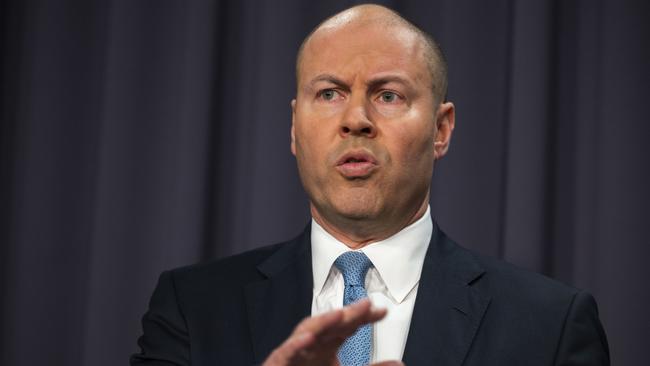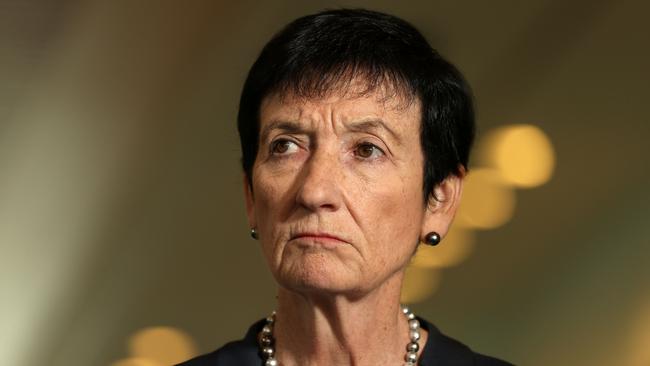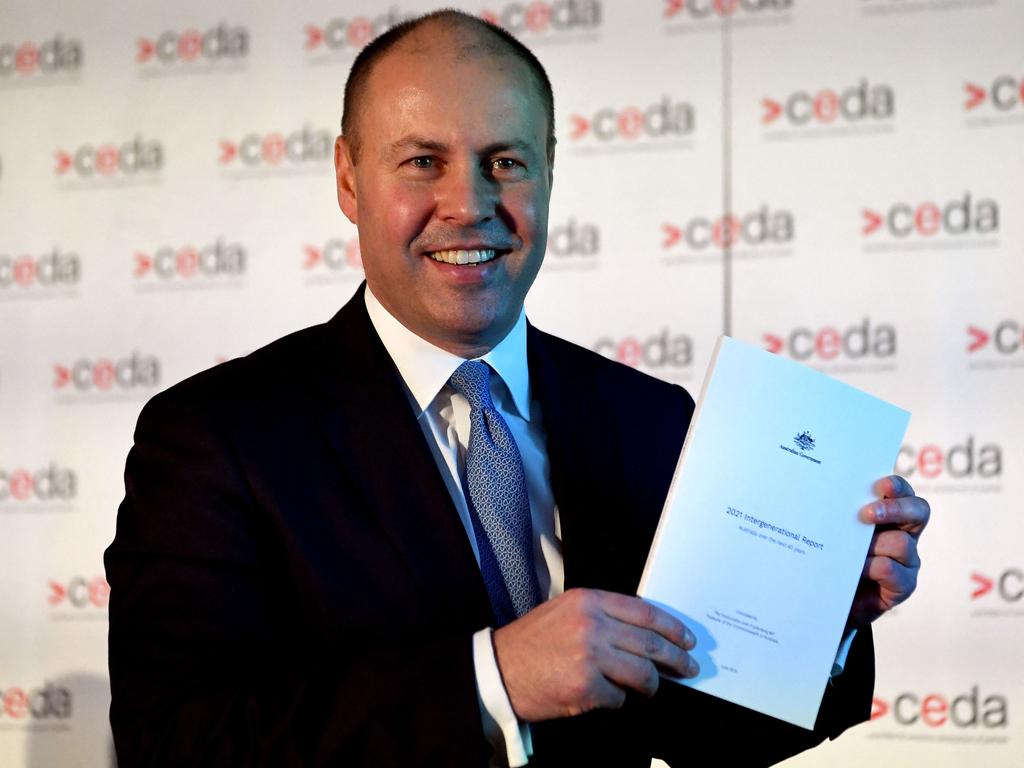Coronavirus: Pandemic tests our ability to revitalise our national purpose
The ugly fracture in Australia’s public life over Covid-19 that should have generated unity risks becoming something far worse.

The ugly fracture in Australia’s public life over the Covid-19 pandemic that should have generated unity and co-operation risks becoming something far worse – a failure of politics to address the challenge to our economic and social life post-pandemic.
Australia has become a short-term, narrow-vision, sectional-interest nation. Our public culture is regressing into a safety-first, protectionist, fortress mindset subservient to the dictates of populist premiers. Squabbles between politicians dominate the media and crowd out any effort to confront our future trajectory.
The juxtaposition this week was telling. The Morrison government released the fifth Intergenerational Report on the structural and demographic future Australia faces – slower economic growth, chronic budget deficits for 40 years, higher government spending, slower population growth, a declining living standards projection – while our political leaders took their brawling over the pandemic and the vaccine rollout to new depths.
The latest test of whether leaders can act as mature grown-ups will be the reaction of premiers to the Morrison-driven national cabinet plan to transition Australia to post-vaccination settings via four stages. The risks are obvious. As many nations begin to open up, Australia’s mood is to shut down more. While the AstraZeneca vaccine has saved Britain, it is demonised in Australia. Blind protectionism promoted by premiers has reached highs few Australians have seen in their lifetime as national unity is subjugated.
The frightening image this week was the reckless and misleading assault on the vaccine rollout by the Queensland Premier, Annastacia Palaszczuk, and her chief medical officer, Jeanette Young, presumably driven by the Premier’s quest to shift blame from her own blunders.
Does Australia face a federal election with ALP premiers campaigning, even engaging in lockdowns, in a brand of politics that will shatter any co-operation on reform for years?
The ultimate question is whether Australia emerges from the pandemic a stronger, more confident nation or a weaker, more divided country. Unless Australia uses the Covid-19 crisis as the pivot to a re-energised national purpose, this will become an inexcusable lost opportunity. The omens are unfavourable.
Our history offers stark lessons in how crisis translates into either an enhanced or diminished country. The Great War’s main legacy was polarised paralysis; the Great Depression bequeathed prolonged demoralisation. Yet, by contrast, there was epic national reconstruction after World War II, and in the 1980s with the launch of a reform renaissance to check economic decline.
Australia is now threatened with declining performance. The risk is a reversion to the worst national character traits we were assumed to have abandoned.
“The pandemic and the recession remind us that pessimism sells,” Productivity Commission chair Michael Brennan said in a recent speech. After reviewing Australia’s stellar economic recovery, Brennan warned of the reversion risk: “Real growth in per capita GDP and incomes over the past decade has been the slowest in 60 years. In terms of income growth, the past decade has resembled the 1970s.”
Unless Australia changes the brutal, negative, reform-veto tactics that consume its politics, then decline will become the story of this generation. The public will pay a damaging price in stagnant wages, a lower living standards trajectory, community division, and growing unhappiness. Brennan warns against the classic blunder: “That our aim should simply be to rebuild the economy of 2019.”

Business Council of Australia chief executive Jennifer Westacott made the same point: “The question I ask is: what are we recovering to? Are we recovering to a world that was pre-Covid? That world was good but it wasn’t great, particularly when you look at the rate of economic and wage growth. We’ve got to be honest with people about how to turn things around.”
Deloitte Access Economics partner Chris Richardson said: “As a nation, we haven’t done the hard yards. We don’t spend enough time thinking about the future. Both sides of politics have brilliantly weaponised the politics of whingeing over the past two decades. The end result is reforms cost too many votes for governments to even try to champion them”. He goes on to warn this is key to the slowdown in living-standards growth.
Former Productivity Commission chair Gary Banks is ringing the warning bell even harder. Taking the theme “never waste a crisis”, Banks says there have been two global crises in the past 15 years – the financial crisis and the pandemic. “Unfortunately, Australia wasted the first crisis and is in danger of wasting the second – which, if realised, would make this a bipartisan achievement.”
Banks explains that massive spending necessary in the immediate stage doesn’t solve the productivity, growth and living standards issue. The public seems not to grasp this. And the political class is conspicuous “for the lack of a strong narrative in support of productivity-enhancing reforms”.
Let’s get one thing clear – the trouble with politics is not just the politicians, but public attitudes. To a large extent, the public gets the politicians it wants – witness the huge support this year for ALP premiers, Mark McGowan, Dan Andrews and Palaszczuk.
This week, two documents confronted Australia’s future – the Treasury’s IGR and the Business Council’s Living on Borrowed Time call to action. They focus on the double legacy from the coronavirus and from the 21st century challenges that predated the virus.
The IGR repudiates much of our self-image. We need to reassess who we are given these forecasts mock the idea of Australia as a young, dynamic, competitive, high-skilled country. Indeed, we exhibit many trends of Western world decline, though Australia is more resilient than most nations in combating this arc of history.
The IGR forecasts economic growth to decline to 2.6 per cent over the next 40 years compared with 3 per cent over the past 40 years. Real gross national income per person will fall from an average annual rate of 1.8 per cent to 1.3 per cent over the next 40 years. That’s a steep decline in living standards trajectory. The budget will remain in deficit for the next four decades and gross debt is projected to be 40.8 per cent of GDP and still rising in 2060-61. The population will be smaller than expected – because of the pandemic and falling fertility rates – reaching 38.8 million in 2060-61, the first downward population revision in any IGR.
Australia will be an older and smaller nation than previously projected. Intergenerational challenges will intensify, with the ratio of working-age people to those over 65 years falling from 4.0 to 2.7 in the next 40 years, a smaller portion of taxpayers against a larger portion of retirees. Migration will become more important in determining the overall population growth. Government will be bigger, with spending in 40 years time projected to reach a higher plateau of 27.7 per cent of GDP. There will be a redistribution of spending priorities, the main drivers being social needs in health, aged care, disability and interest on debt. Contrary to government assumptions, higher taxation will be needed to fund such spending. Real government spending per person will rise from $22,420 in 2020-21 to $38,680 by 2060-61.
People will have different views on whether these trends are negative. The IGR’s value is that it assumes the policy status quo and looks where the structural and demographic drivers are taking Australia. But policy won’t stay the same. It will change. The issue is whether it changes these outcomes for the better, or worse.
The real question thrown up by the IGR is whether Australia passively accepts this trajectory of decline or has the cohesion and leadership to master more of its own destiny. There is one certainty – unless Australia can break free of the significant reform paralysis displayed in its political system over the past 15 years it will face a tougher future performing far below its potential and below what a responsible democratic system should deliver.
Australia faces its own version of the Western world “performance deficit” as seen in the US and Europe for much of the past 20 years. The brand of “veto politics” pervasive in Australia since the end of the Howard government – where most ambitious reforms are either vetoed or not even proposed – will come with an even heavier price unless the political system changes fundamentally. The IGR puts numbers on the living standards decline yet this is an incremental story that becomes a big story over time – but a story unlikely to engage a media obsessed exclusively with short-term drama.
Richardson captured our malaise, saying: “You wouldn’t back us in a reform crisis. It’s not governments that run Australia, its oppositions. What we have in politics is supposedly successful oppositions leading to dangerously weak governments.”
Delivering the BCA report, Westacott said: “With the prospect of a slower-growing economy, record public debt, weak population growth and a tax system that will struggle to fund future spending demands, something needs to give. It now takes an average worker seven years to increase their pay by $100 a fortnight. In the past, workers were getting that size pay rise every year or two. It’s why people don’t feel they are getting ahead.”
The cultural chasm afflicting Australians is the disconnect in public life between reform, on the one hand, usually seen as unpopular, and the benefits on the other hand, in the form of higher national and individual income.
Post-pandemic, most nations will be racing to rebuild their economies. Where will Australia rate in this race?
Highlighting the imperative for reform, Westacott said: “Achieving a 1 per cent increase in productivity growth a year by producing goods and services more efficiently and smarter would deliver an extra $10,000 in average incomes for Australians over a decade.
“The consequences of inaction just build up over time. People say there are no consequences from not doing these reforms. But there are consequences – and they’re enormous.”
Describing the dead-end in which Australia languishes, the BCA paper said: “There have been countless reviews over the past 20 years arguing the case for reform to lift living standards, growth and wages. But unlike in the past, when governments now attempt to make even modest reforms they are met with community resistance. Building a consensus for change has become harder. The reality is that while Australia seems to be travelling OK, the momentum for growth in living standards has gone and won’t return without further reform.”
In case you think these warnings exaggerate the problem, you’re wrong. Indeed, the IGR is heroically optimistic. Future living standards will be determined largely by future productivity growth, and the IGR’s assumptions on productivity look untenable. It assumes productivity growing at 1.5 per cent annually over the next 40 years because this was the rate in the 30 years leading up to 2018-19. Yet productivity growth over the six years from 2011-12 was only 1.2 per cent, and over the past five years was only 0.5 per cent.
Richardson said: “Actual productivity gains since the last IGR was delivered have been barely one third of the rate that Treasury assumes we will manage over the next four decades.”
Banks is scathing. He doubts that productivity at 1.5 per cent is “achievable at all under current policy”. He warns the current debate risks the impression “that governments create wealth rather than just redistribute it”. Indeed, much of the media debate seems heavily premised on this assumption. If the Banks/Richardson critique is correct, the Australian people face a hit on economic growth, debt and living standards worse than forecast.
Trying to rescue the situation, Westacott said the aim of the BCA’s paper, rather than propose detailed policy, was to see “if we can get some agreement at least on the big shifts we need to make and then build more consensus about that direction”.
The six shifts are: a more diversified industrial base; a low-carbon economy; openness to the world; lifting workforce skills; ensuring nobody is left behind; and rebuilding public finances. Surely, wide agreement can be reached on this, you might think. But don’t count on it. As Westacott asked: “If not this, then what?”
Josh Frydenberg provided a detailed and frank response to the IGR, saying: “If we want to maintain our living standards, generate higher wages and create more jobs, Australia has no alternative other than to pursue economic reform, most of which is hard and contested. It is a national imperative. But, the recipe for reforms is unlikely to be the same as in the past. There is no silver bullet.
“Increasingly, reform is likely to be more incremental – taking each and every opportunity to boost productivity, no matter how big or small.”
This sounds realistic. The recent passage of superannuation reforms is a case study in how progress can be made. But neither Scott Morrison nor the Treasurer is going to commit electoral suicide by proposing national interest reforms that give their opponents and the progressive media the chance to terminate their government.
Frydenberg points to progress via recent insolvency reforms, the new digital platforms policy, streamlining of the personal income tax system with a 30 per cent rate for most people, a new “patent box” to encourage commercialisation of innovation – all evidence that reform these days is about “nuts and bolts” of improving micro aspects of the system.
That’s progress but it won’t be enough given the scale of the challenge.
The Treasurer said the IGR affirmed the Morrison government’s fiscal position was “sound and sustainable”. Yet this conceals core truths. The gap between future spending and the government’s 23.9 per cent ceiling on revenue is unsustainable. The IGR smashes the beloved Liberal and Labor orthodoxies. “The message in this IGR is that at some stage we will need a combination of tax increases and spending cuts,” Richardson said.
The Australian people aren’t happy. Looking at wages and house prices they sense abnormal forces at work. In the 1980s, there was a high degree of economic literacy but that seems largely gone. Australia has done far better than most other rich nations in the past 30 years yet our performance in the most recent decade is sliding and it is tied to political and social divisions and disruption.
The risk is we will finish exhausted by the virus, dreaming of a better life, avoiding a challenging life. But life will change anyway, and there are opportunities to have both a better life and a challenging life. However, the self-serving, blame-shifting, fearmongering politics of the virus is doing real damage to this nation’s fabric. Unless it ends, the omens will get darker.







